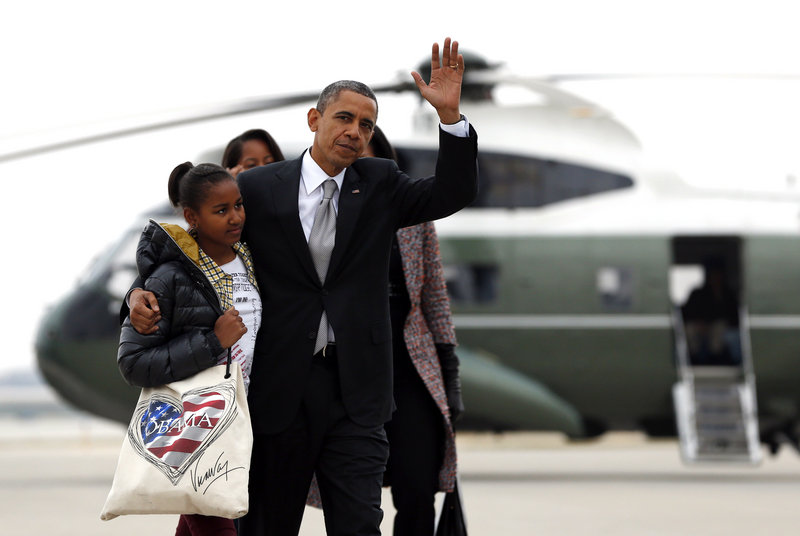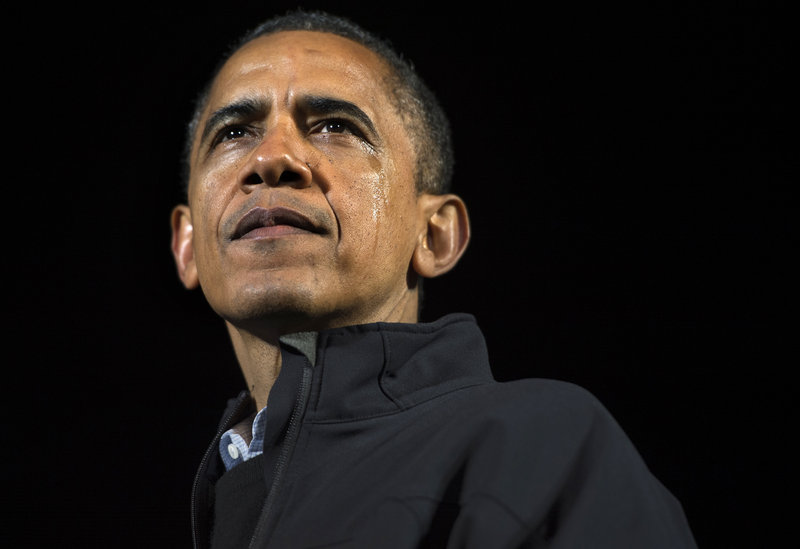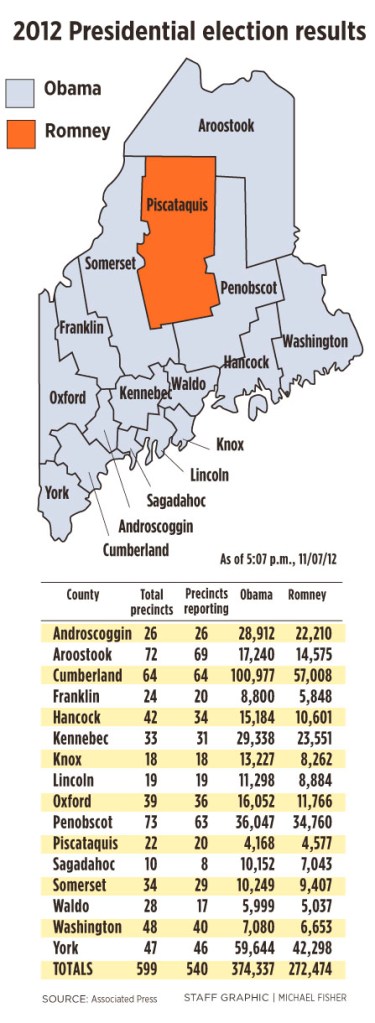President Barack Obama began his transition Wednesday from candidate back to head of government, pausing as he did to swing through campaign headquarters and thank the people who worked for months to keep him in office.
Lingering in his home town of Chicago, where he celebrated his victory the previous evening, Obama received a standing ovation as he visited hundreds of campaign staffers, some of whom scrambled on top of desks to get a better view of him.
But as he completed a brief victory lap, Obama also turned toward governing again, arriving early Wednesday evening in the same divided Washington that has vexed him for the past two years.
Obama now has an opportunity to change the way his administration operates and expand the agenda it pursues. Almost immediately, he will address a host of expected departures in his senior staff, giving him the chance to fill out the top levels of his administration with new people best suited to achieve his second-term ambitions.
“There’s a lot of flexibility in how you do it,” said Martha Kumar, a Towson University professor of political science who specializes in presidential transitions. “You work with what you’ve got and the environment you’re in, and right now for this president that’s the fiscal-cliff issues.”
The campaign season has effectively frozen the business of Washington for much of the past year. Obama now faces a year-end fiscal showdown with a Congress largely unchanged by the recent election, as well as his own second-term staffing issues in the White House and at key Cabinet agencies.
The ratification he received Tuesday with a decisive electoral win is already being challenged by some Republican congressional leaders, who have warned that the victory should not be viewed automatically as a broad mandate for tax-rate increases on wealthy Americans and other issues on which Obama campaigned.
But other Republicans took a step back Wednesday from promised opposition, as the party and its leaders reviewed the demographic data showing just what doomed their presidential candidate and cost them a net loss of two Senate seats.
“I hope there’s going to be some real soul-searching (in the) Republican Party about what they’re willing to cooperate on,” Vice President Joe Biden told reporters traveling aboard Air Force Two.
Referring to the election results, Biden said, “I think the real takeaway is: What is the takeaway going to be on the part of our Republican colleagues?”
Beyond the immediate fiscal concerns, Obama will use some of his remaining first term to set out an agenda for his second.
Even before Tuesday, White House officials identified immigration reform as one issue Obama would seek to work on with Republicans if reelected.
Given the large Latino turnout in Obama’s favor — he won that vote by more than 40 points — Republican leaders may be more encouraged to collaborate with the president on the issue and improve their image with a fast-growing section of the electorate.
“I feel very optimistic about, in my view, immigration reform,” Biden said Wednesday. “Because as we talked about with most of the Hispanic communities I spoke with over the last month, it played a major role. And that’s got to be a wake-up call for a lot of my Republican colleagues.”
In his victory speech, Obama mentioned taxes, the deficit, energy independence and immigration reform as parts of his coming agenda.
He also made a glancing reference to another issue that many Democrats, and Obama himself, have elevated recently to a possible priority in a second term: political reform.
A package of legislation could include bills to make voting easier across the country and a constitutional amendment to invalidate the Supreme Court’s 2010 Citizens United decision, which allowed corporations, labor unions and other interest groups to spend unlimited amounts of money on behalf of candidates.
Asked two months before Election Day what he would do about “the corrupting influence” of money in politics, Obama said he would “seriously consider” such a push, noting that “even if the amendment process falls short, it can shine a spotlight on the super PAC phenomenon and help apply pressure for change.”
Some state efforts to make it more difficult for people to vote and the long lines Tuesday outside some polling stations — many of them in urban neighborhoods where Obama was expected to do well — have drawn calls over the campaign and in its immediate aftermath for an overhaul of U.S. election laws.
In his victory remarks, Obama thanked the audience and others watching the broadcast of the event “whether you voted for the first time or waited in line for a very long time.”
“By the way, we have to fix that,” he said to loud applause.
How Obama staffs his White House and Cabinet agencies to pursue his goals will become clear sooner rather than later.
A Cabinet that has been stable during the first four years of his presidency is about to undergo a broad turnover. Of the 15 department secretaries, 13 have remained in place, leaving a number of them worn out.
If recent history is a guide, Obama will make most high-level staff changes in the next six weeks. President George W. Bush, who had the same stability in his first-term Cabinet, named nine new department secretaries between Election Day and the end of the year.
Before Obama’s win, Secretary of State Hillary Rodham Clinton and Treasury Secretary Timothy F. Geithner made clear they intended to leave after the first term, setting in motion a search for their successors inside and outside the administration.
U.N. Ambassador Susan Rice had been considered a leading candidate to replace Clinton. But Rice’s involvement in the administration’s shifting account of the Sept. 11 attack on a U.S. mission in Benghazi, Libya, may have undermined her candidacy.
Sen. John Kerry, D-Mass., who helped Obama prepare for the debates with Romney, is another contender to head the State Department, as is national security adviser Thomas Donilon, who served as chief of staff to Secretary of State Warren Christopher.
Defense Secretary Leon Panetta is expected to retire, although he may stay in his post until the confrontation with Congress over the looming automatic budget cuts is resolved. The Pentagon faces $55 billion in across-the-board cuts early next year unless Congress and the White House find a way to offset them.
One Democratic contender to replace Panetta is Deputy Defense Secretary Ashton Carter. Carter, who holds a doctorate in theoretical physics from Oxford, served in the Clinton administration as assistant secretary of defense for international security policy.
Michele Flournoy, who served for three years as undersecretary of defense for policy, resigned in February to spend more time with her three school-age children. But she appeared again during the campaign as a public advocate and campaign adviser for Obama on national security issues.
The understated White House chief of staff Jacob J. Lew, a former Office of Management and Budget director, is a leading candidate to replace Geithner in a second Obama term.
But Lew is also valuable in his current job heading into potentially difficult fiscal negotiations with Congress. A former top aide to House Speaker Thomas P. “Tip” O’Neill, D-Mass., Lew is known as a skilled negotiator with credibility across the aisle on Capitol Hill.
Send questions/comments to the editors.





Comments are no longer available on this story